The Vietnam War: Assessing Military and Political Factors in US Defeat
VerifiedAdded on 2024/06/27
|10
|1742
|201
Essay
AI Summary
This essay delves into the multifaceted reasons behind the United States' defeat in the Vietnam War, questioning whether the failure stemmed primarily from military or political shortcomings. It examines the role of broadcasting companies in shaping public opinion, the failures of political will and strategic planning, the impact of the anti-war movement on government decision-making, and the shortcomings of US military strategies in countering guerrilla warfare. Furthermore, the essay emphasizes the critical failure of the US to understand the Vietnamese context, including the strength of Vietnamese nationalism, the appeal of communism to an economically disenfranchised population, and the cultural and historical nuances of the region. Ultimately, the essay concludes that the US defeat was a result of the combination of these factors.

Essay
1
1
Paraphrase This Document
Need a fresh take? Get an instant paraphrase of this document with our AI Paraphraser
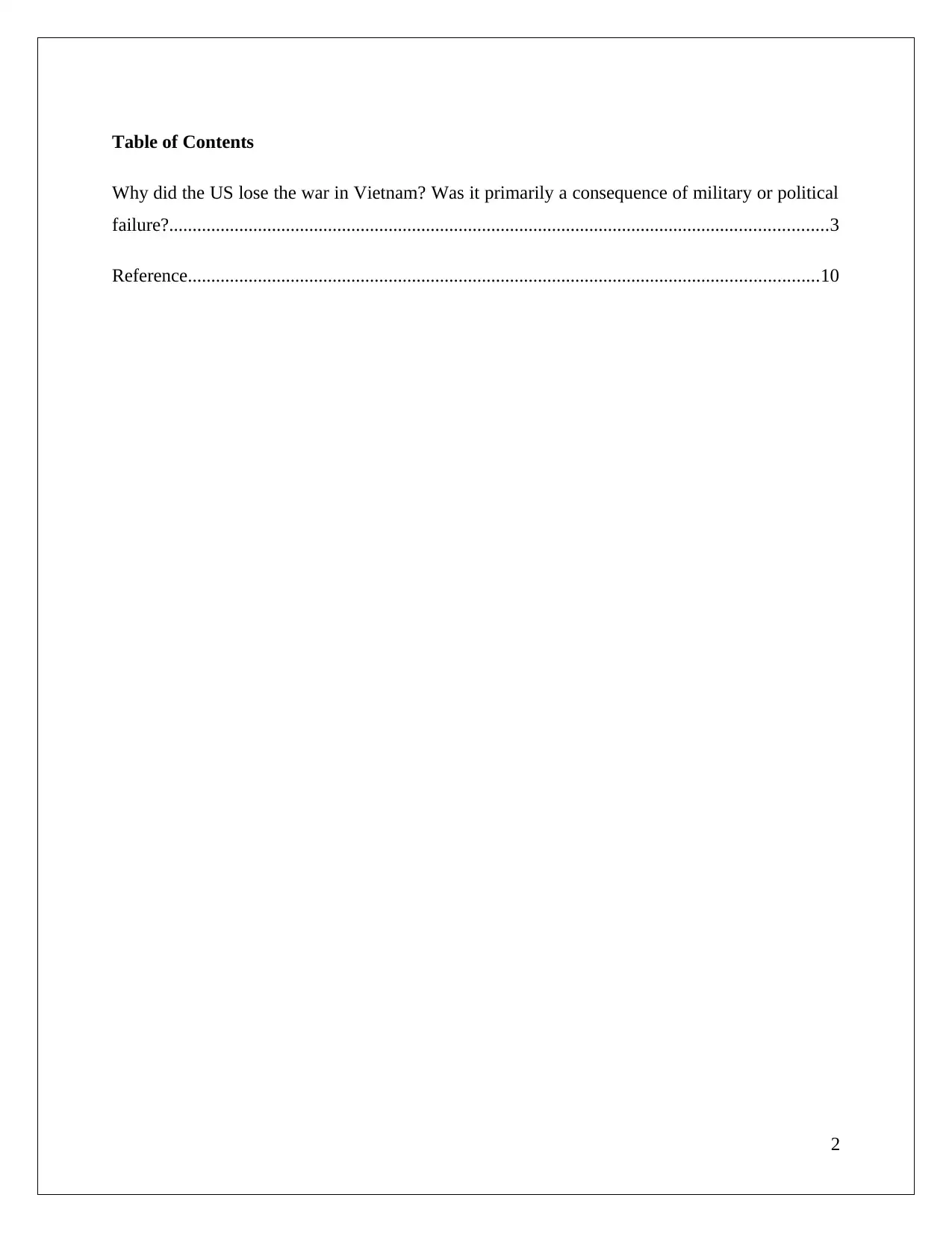
Table of Contents
Why did the US lose the war in Vietnam? Was it primarily a consequence of military or political
failure?.............................................................................................................................................3
Reference.......................................................................................................................................10
2
Why did the US lose the war in Vietnam? Was it primarily a consequence of military or political
failure?.............................................................................................................................................3
Reference.......................................................................................................................................10
2
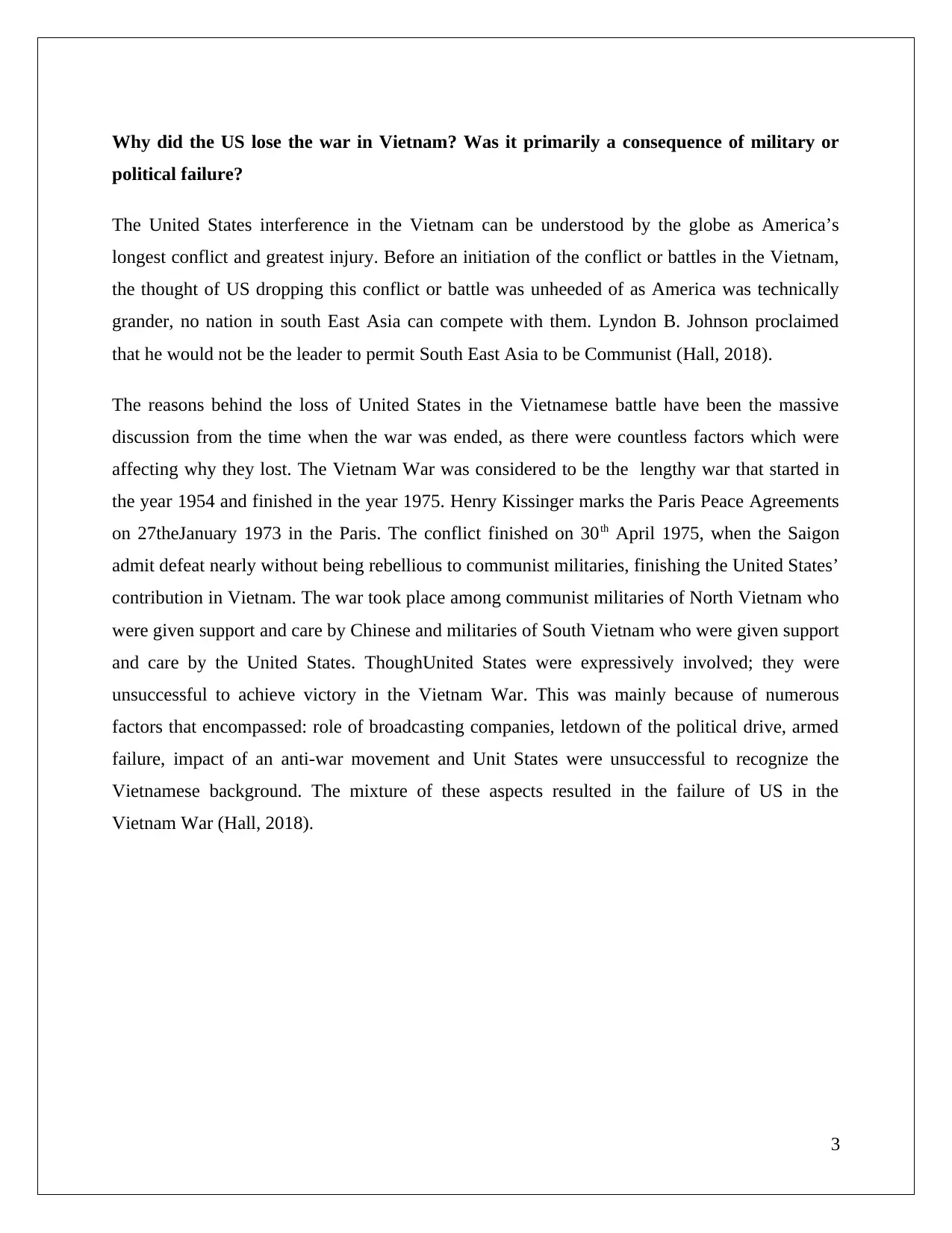
Why did the US lose the war in Vietnam? Was it primarily a consequence of military or
political failure?
The United States interference in the Vietnam can be understood by the globe as America’s
longest conflict and greatest injury. Before an initiation of the conflict or battles in the Vietnam,
the thought of US dropping this conflict or battle was unheeded of as America was technically
grander, no nation in south East Asia can compete with them. Lyndon B. Johnson proclaimed
that he would not be the leader to permit South East Asia to be Communist (Hall, 2018).
The reasons behind the loss of United States in the Vietnamese battle have been the massive
discussion from the time when the war was ended, as there were countless factors which were
affecting why they lost. The Vietnam War was considered to be the lengthy war that started in
the year 1954 and finished in the year 1975. Henry Kissinger marks the Paris Peace Agreements
on 27theJanuary 1973 in the Paris. The conflict finished on 30th April 1975, when the Saigon
admit defeat nearly without being rebellious to communist militaries, finishing the United States’
contribution in Vietnam. The war took place among communist militaries of North Vietnam who
were given support and care by Chinese and militaries of South Vietnam who were given support
and care by the United States. ThoughUnited States were expressively involved; they were
unsuccessful to achieve victory in the Vietnam War. This was mainly because of numerous
factors that encompassed: role of broadcasting companies, letdown of the political drive, armed
failure, impact of an anti-war movement and Unit States were unsuccessful to recognize the
Vietnamese background. The mixture of these aspects resulted in the failure of US in the
Vietnam War (Hall, 2018).
3
political failure?
The United States interference in the Vietnam can be understood by the globe as America’s
longest conflict and greatest injury. Before an initiation of the conflict or battles in the Vietnam,
the thought of US dropping this conflict or battle was unheeded of as America was technically
grander, no nation in south East Asia can compete with them. Lyndon B. Johnson proclaimed
that he would not be the leader to permit South East Asia to be Communist (Hall, 2018).
The reasons behind the loss of United States in the Vietnamese battle have been the massive
discussion from the time when the war was ended, as there were countless factors which were
affecting why they lost. The Vietnam War was considered to be the lengthy war that started in
the year 1954 and finished in the year 1975. Henry Kissinger marks the Paris Peace Agreements
on 27theJanuary 1973 in the Paris. The conflict finished on 30th April 1975, when the Saigon
admit defeat nearly without being rebellious to communist militaries, finishing the United States’
contribution in Vietnam. The war took place among communist militaries of North Vietnam who
were given support and care by Chinese and militaries of South Vietnam who were given support
and care by the United States. ThoughUnited States were expressively involved; they were
unsuccessful to achieve victory in the Vietnam War. This was mainly because of numerous
factors that encompassed: role of broadcasting companies, letdown of the political drive, armed
failure, impact of an anti-war movement and Unit States were unsuccessful to recognize the
Vietnamese background. The mixture of these aspects resulted in the failure of US in the
Vietnam War (Hall, 2018).
3
⊘ This is a preview!⊘
Do you want full access?
Subscribe today to unlock all pages.

Trusted by 1+ million students worldwide
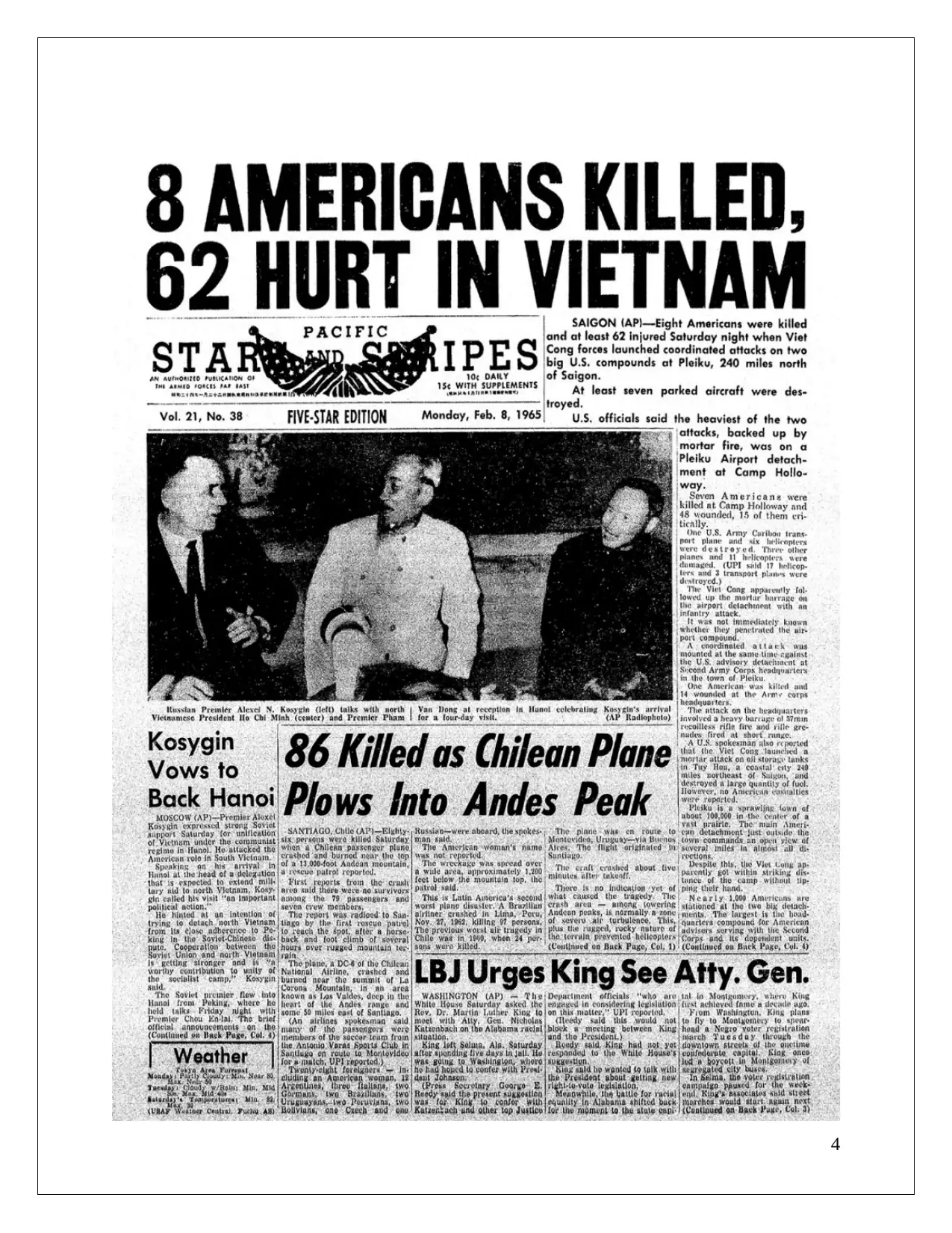
4
Paraphrase This Document
Need a fresh take? Get an instant paraphrase of this document with our AI Paraphraser
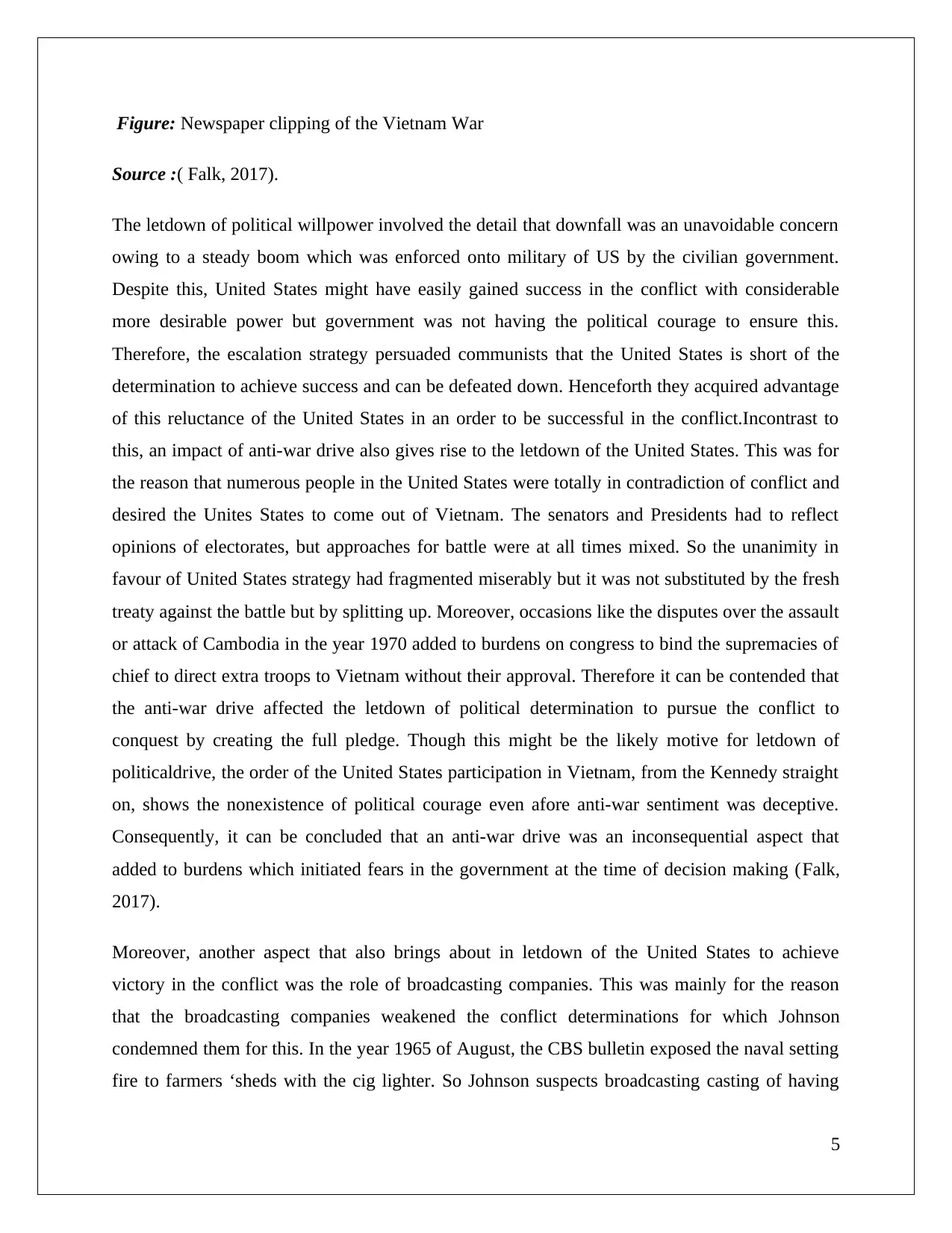
Figure: Newspaper clipping of the Vietnam War
Source :( Falk, 2017).
The letdown of political willpower involved the detail that downfall was an unavoidable concern
owing to a steady boom which was enforced onto military of US by the civilian government.
Despite this, United States might have easily gained success in the conflict with considerable
more desirable power but government was not having the political courage to ensure this.
Therefore, the escalation strategy persuaded communists that the United States is short of the
determination to achieve success and can be defeated down. Henceforth they acquired advantage
of this reluctance of the United States in an order to be successful in the conflict.Incontrast to
this, an impact of anti-war drive also gives rise to the letdown of the United States. This was for
the reason that numerous people in the United States were totally in contradiction of conflict and
desired the Unites States to come out of Vietnam. The senators and Presidents had to reflect
opinions of electorates, but approaches for battle were at all times mixed. So the unanimity in
favour of United States strategy had fragmented miserably but it was not substituted by the fresh
treaty against the battle but by splitting up. Moreover, occasions like the disputes over the assault
or attack of Cambodia in the year 1970 added to burdens on congress to bind the supremacies of
chief to direct extra troops to Vietnam without their approval. Therefore it can be contended that
the anti-war drive affected the letdown of political determination to pursue the conflict to
conquest by creating the full pledge. Though this might be the likely motive for letdown of
politicaldrive, the order of the United States participation in Vietnam, from the Kennedy straight
on, shows the nonexistence of political courage even afore anti-war sentiment was deceptive.
Consequently, it can be concluded that an anti-war drive was an inconsequential aspect that
added to burdens which initiated fears in the government at the time of decision making (Falk,
2017).
Moreover, another aspect that also brings about in letdown of the United States to achieve
victory in the conflict was the role of broadcasting companies. This was mainly for the reason
that the broadcasting companies weakened the conflict determinations for which Johnson
condemned them for this. In the year 1965 of August, the CBS bulletin exposed the naval setting
fire to farmers ‘sheds with the cig lighter. So Johnson suspects broadcasting casting of having
5
Source :( Falk, 2017).
The letdown of political willpower involved the detail that downfall was an unavoidable concern
owing to a steady boom which was enforced onto military of US by the civilian government.
Despite this, United States might have easily gained success in the conflict with considerable
more desirable power but government was not having the political courage to ensure this.
Therefore, the escalation strategy persuaded communists that the United States is short of the
determination to achieve success and can be defeated down. Henceforth they acquired advantage
of this reluctance of the United States in an order to be successful in the conflict.Incontrast to
this, an impact of anti-war drive also gives rise to the letdown of the United States. This was for
the reason that numerous people in the United States were totally in contradiction of conflict and
desired the Unites States to come out of Vietnam. The senators and Presidents had to reflect
opinions of electorates, but approaches for battle were at all times mixed. So the unanimity in
favour of United States strategy had fragmented miserably but it was not substituted by the fresh
treaty against the battle but by splitting up. Moreover, occasions like the disputes over the assault
or attack of Cambodia in the year 1970 added to burdens on congress to bind the supremacies of
chief to direct extra troops to Vietnam without their approval. Therefore it can be contended that
the anti-war drive affected the letdown of political determination to pursue the conflict to
conquest by creating the full pledge. Though this might be the likely motive for letdown of
politicaldrive, the order of the United States participation in Vietnam, from the Kennedy straight
on, shows the nonexistence of political courage even afore anti-war sentiment was deceptive.
Consequently, it can be concluded that an anti-war drive was an inconsequential aspect that
added to burdens which initiated fears in the government at the time of decision making (Falk,
2017).
Moreover, another aspect that also brings about in letdown of the United States to achieve
victory in the conflict was the role of broadcasting companies. This was mainly for the reason
that the broadcasting companies weakened the conflict determinations for which Johnson
condemned them for this. In the year 1965 of August, the CBS bulletin exposed the naval setting
fire to farmers ‘sheds with the cig lighter. So Johnson suspects broadcasting casting of having
5
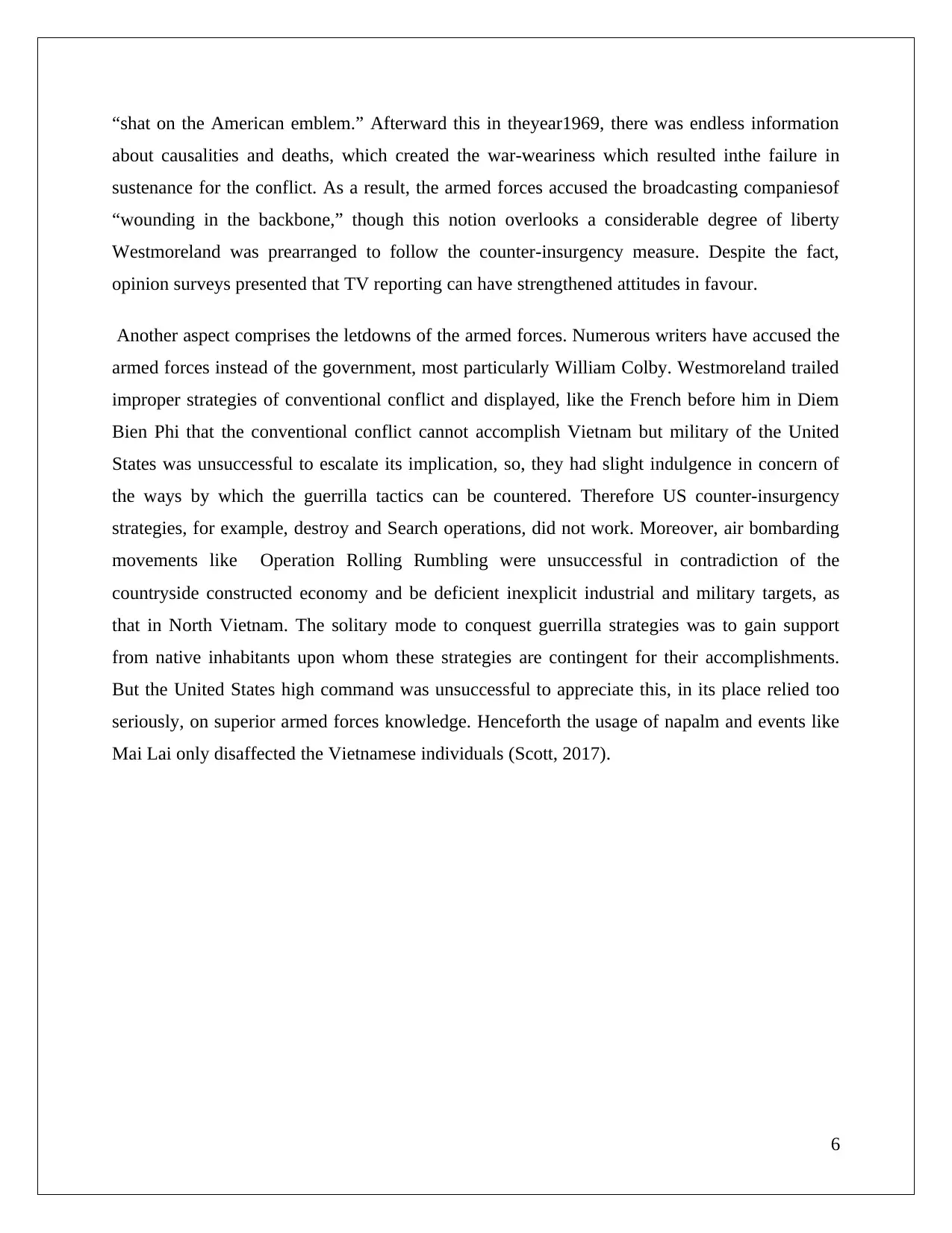
“shat on the American emblem.” Afterward this in theyear1969, there was endless information
about causalities and deaths, which created the war-weariness which resulted inthe failure in
sustenance for the conflict. As a result, the armed forces accused the broadcasting companiesof
“wounding in the backbone,” though this notion overlooks a considerable degree of liberty
Westmoreland was prearranged to follow the counter-insurgency measure. Despite the fact,
opinion surveys presented that TV reporting can have strengthened attitudes in favour.
Another aspect comprises the letdowns of the armed forces. Numerous writers have accused the
armed forces instead of the government, most particularly William Colby. Westmoreland trailed
improper strategies of conventional conflict and displayed, like the French before him in Diem
Bien Phi that the conventional conflict cannot accomplish Vietnam but military of the United
States was unsuccessful to escalate its implication, so, they had slight indulgence in concern of
the ways by which the guerrilla tactics can be countered. Therefore US counter-insurgency
strategies, for example, destroy and Search operations, did not work. Moreover, air bombarding
movements like Operation Rolling Rumbling were unsuccessful in contradiction of the
countryside constructed economy and be deficient inexplicit industrial and military targets, as
that in North Vietnam. The solitary mode to conquest guerrilla strategies was to gain support
from native inhabitants upon whom these strategies are contingent for their accomplishments.
But the United States high command was unsuccessful to appreciate this, in its place relied too
seriously, on superior armed forces knowledge. Henceforth the usage of napalm and events like
Mai Lai only disaffected the Vietnamese individuals (Scott, 2017).
6
about causalities and deaths, which created the war-weariness which resulted inthe failure in
sustenance for the conflict. As a result, the armed forces accused the broadcasting companiesof
“wounding in the backbone,” though this notion overlooks a considerable degree of liberty
Westmoreland was prearranged to follow the counter-insurgency measure. Despite the fact,
opinion surveys presented that TV reporting can have strengthened attitudes in favour.
Another aspect comprises the letdowns of the armed forces. Numerous writers have accused the
armed forces instead of the government, most particularly William Colby. Westmoreland trailed
improper strategies of conventional conflict and displayed, like the French before him in Diem
Bien Phi that the conventional conflict cannot accomplish Vietnam but military of the United
States was unsuccessful to escalate its implication, so, they had slight indulgence in concern of
the ways by which the guerrilla tactics can be countered. Therefore US counter-insurgency
strategies, for example, destroy and Search operations, did not work. Moreover, air bombarding
movements like Operation Rolling Rumbling were unsuccessful in contradiction of the
countryside constructed economy and be deficient inexplicit industrial and military targets, as
that in North Vietnam. The solitary mode to conquest guerrilla strategies was to gain support
from native inhabitants upon whom these strategies are contingent for their accomplishments.
But the United States high command was unsuccessful to appreciate this, in its place relied too
seriously, on superior armed forces knowledge. Henceforth the usage of napalm and events like
Mai Lai only disaffected the Vietnamese individuals (Scott, 2017).
6
⊘ This is a preview!⊘
Do you want full access?
Subscribe today to unlock all pages.

Trusted by 1+ million students worldwide
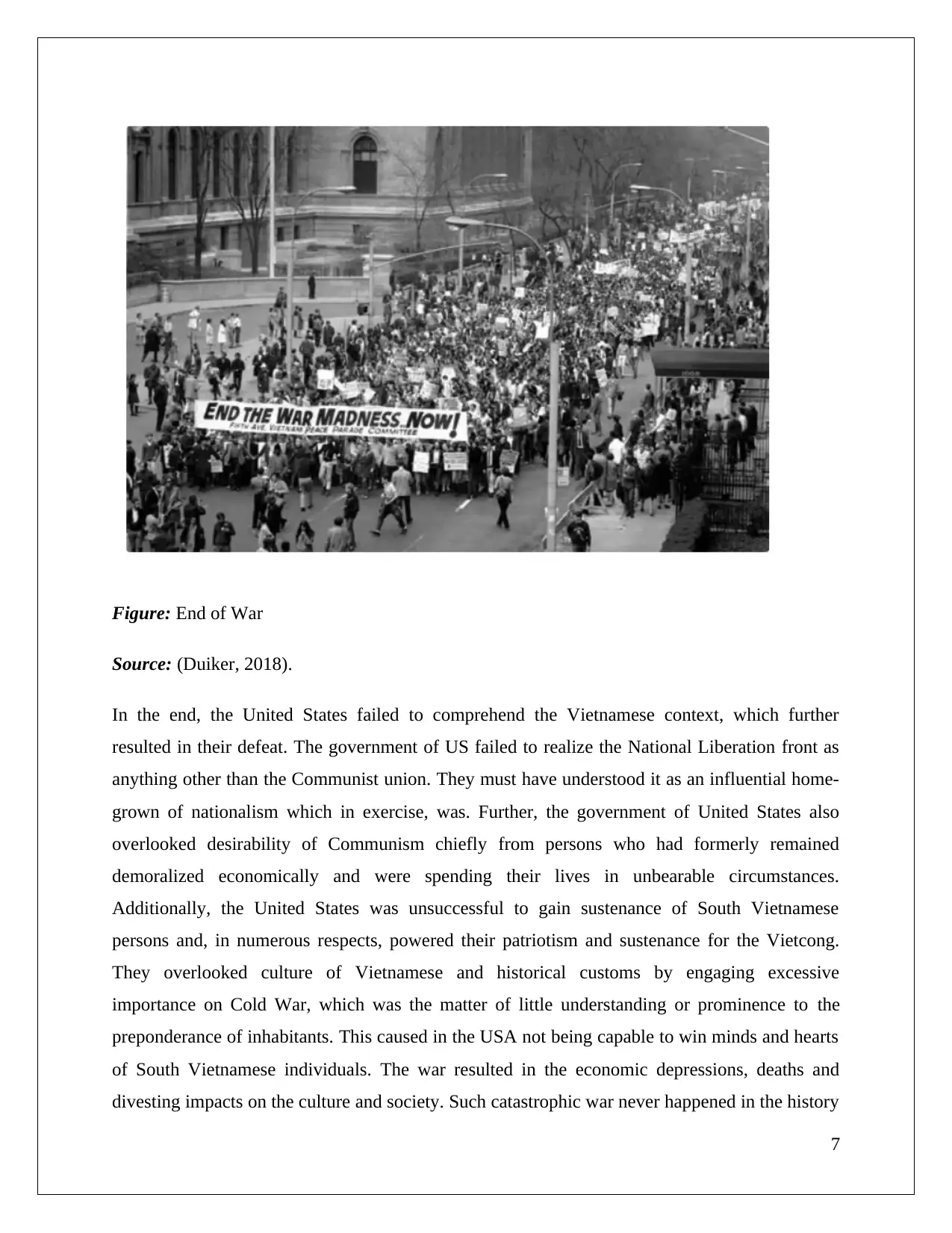
Figure: End of War
Source: (Duiker, 2018).
In the end, the United States failed to comprehend the Vietnamese context, which further
resulted in their defeat. The government of US failed to realize the National Liberation front as
anything other than the Communist union. They must have understood it as an influential home-
grown of nationalism which in exercise, was. Further, the government of United States also
overlooked desirability of Communism chiefly from persons who had formerly remained
demoralized economically and were spending their lives in unbearable circumstances.
Additionally, the United States was unsuccessful to gain sustenance of South Vietnamese
persons and, in numerous respects, powered their patriotism and sustenance for the Vietcong.
They overlooked culture of Vietnamese and historical customs by engaging excessive
importance on Cold War, which was the matter of little understanding or prominence to the
preponderance of inhabitants. This caused in the USA not being capable to win minds and hearts
of South Vietnamese individuals. The war resulted in the economic depressions, deaths and
divesting impacts on the culture and society. Such catastrophic war never happened in the history
7
Source: (Duiker, 2018).
In the end, the United States failed to comprehend the Vietnamese context, which further
resulted in their defeat. The government of US failed to realize the National Liberation front as
anything other than the Communist union. They must have understood it as an influential home-
grown of nationalism which in exercise, was. Further, the government of United States also
overlooked desirability of Communism chiefly from persons who had formerly remained
demoralized economically and were spending their lives in unbearable circumstances.
Additionally, the United States was unsuccessful to gain sustenance of South Vietnamese
persons and, in numerous respects, powered their patriotism and sustenance for the Vietcong.
They overlooked culture of Vietnamese and historical customs by engaging excessive
importance on Cold War, which was the matter of little understanding or prominence to the
preponderance of inhabitants. This caused in the USA not being capable to win minds and hearts
of South Vietnamese individuals. The war resulted in the economic depressions, deaths and
divesting impacts on the culture and society. Such catastrophic war never happened in the history
7
Paraphrase This Document
Need a fresh take? Get an instant paraphrase of this document with our AI Paraphraser
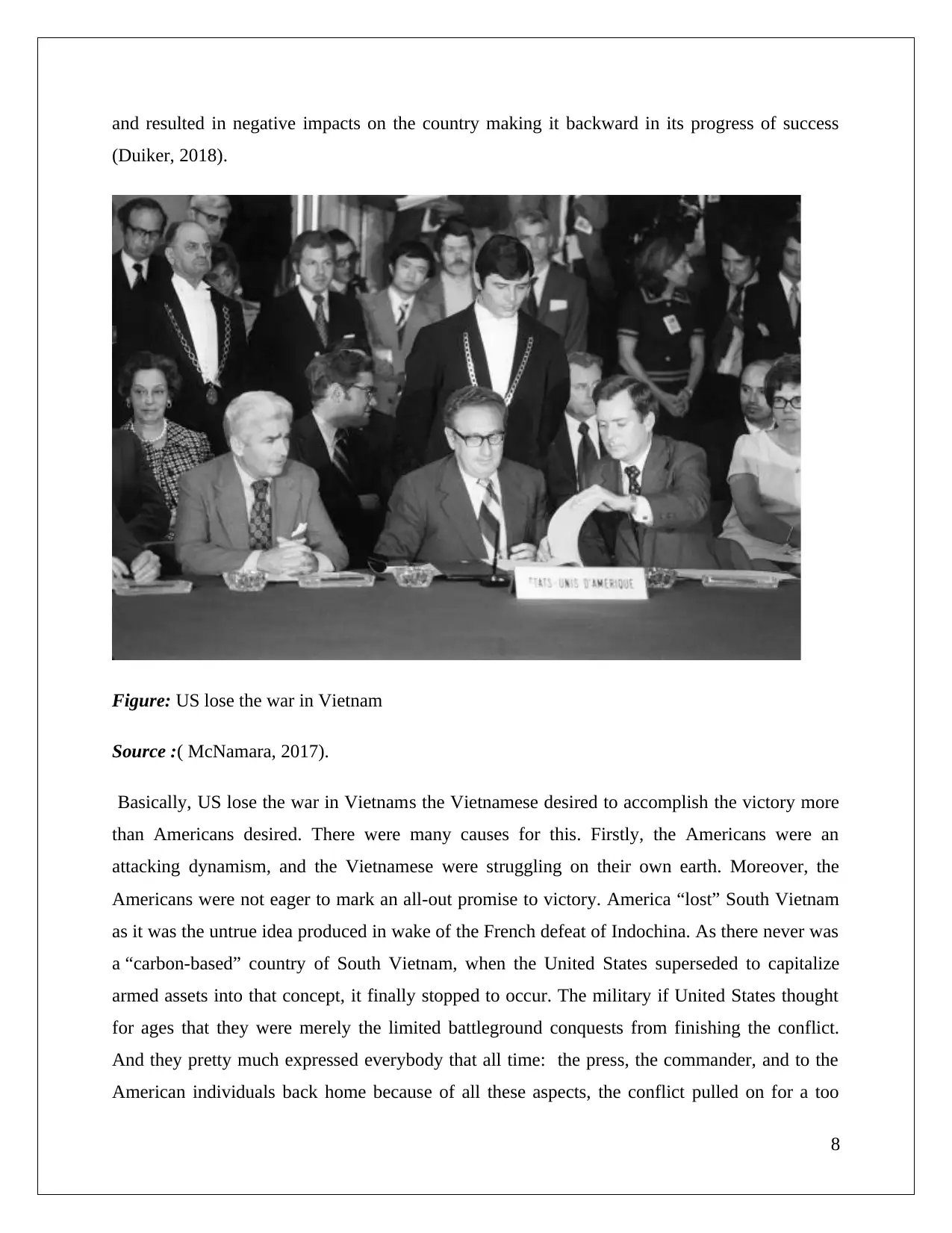
and resulted in negative impacts on the country making it backward in its progress of success
(Duiker, 2018).
Figure: US lose the war in Vietnam
Source :( McNamara, 2017).
Basically, US lose the war in Vietnams the Vietnamese desired to accomplish the victory more
than Americans desired. There were many causes for this. Firstly, the Americans were an
attacking dynamism, and the Vietnamese were struggling on their own earth. Moreover, the
Americans were not eager to mark an all-out promise to victory. America “lost” South Vietnam
as it was the untrue idea produced in wake of the French defeat of Indochina. As there never was
a “carbon-based” country of South Vietnam, when the United States superseded to capitalize
armed assets into that concept, it finally stopped to occur. The military if United States thought
for ages that they were merely the limited battleground conquests from finishing the conflict.
And they pretty much expressed everybody that all time: the press, the commander, and to the
American individuals back home because of all these aspects, the conflict pulled on for a too
8
(Duiker, 2018).
Figure: US lose the war in Vietnam
Source :( McNamara, 2017).
Basically, US lose the war in Vietnams the Vietnamese desired to accomplish the victory more
than Americans desired. There were many causes for this. Firstly, the Americans were an
attacking dynamism, and the Vietnamese were struggling on their own earth. Moreover, the
Americans were not eager to mark an all-out promise to victory. America “lost” South Vietnam
as it was the untrue idea produced in wake of the French defeat of Indochina. As there never was
a “carbon-based” country of South Vietnam, when the United States superseded to capitalize
armed assets into that concept, it finally stopped to occur. The military if United States thought
for ages that they were merely the limited battleground conquests from finishing the conflict.
And they pretty much expressed everybody that all time: the press, the commander, and to the
American individuals back home because of all these aspects, the conflict pulled on for a too
8
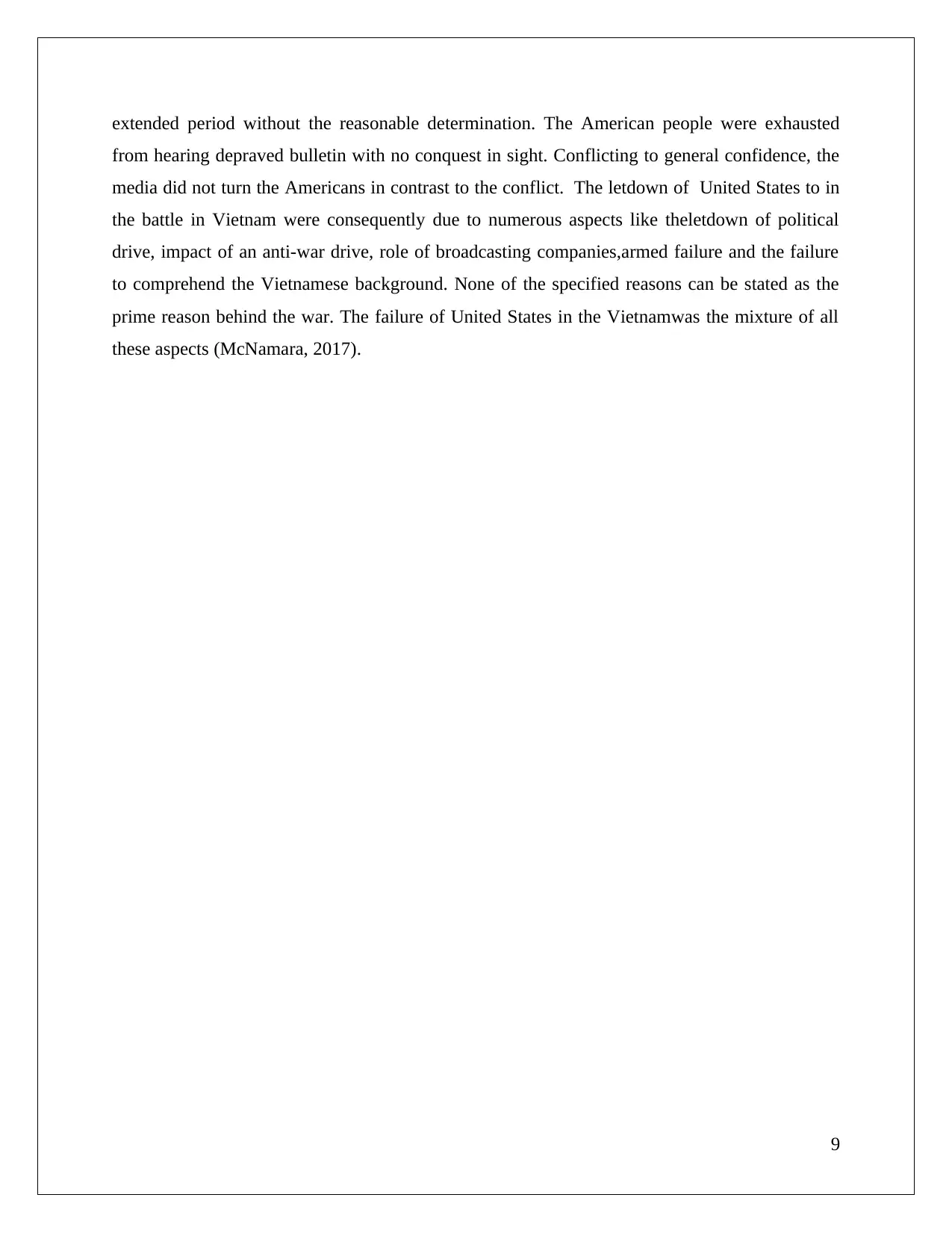
extended period without the reasonable determination. The American people were exhausted
from hearing depraved bulletin with no conquest in sight. Conflicting to general confidence, the
media did not turn the Americans in contrast to the conflict. The letdown of United States to in
the battle in Vietnam were consequently due to numerous aspects like theletdown of political
drive, impact of an anti-war drive, role of broadcasting companies,armed failure and the failure
to comprehend the Vietnamese background. None of the specified reasons can be stated as the
prime reason behind the war. The failure of United States in the Vietnamwas the mixture of all
these aspects (McNamara, 2017).
9
from hearing depraved bulletin with no conquest in sight. Conflicting to general confidence, the
media did not turn the Americans in contrast to the conflict. The letdown of United States to in
the battle in Vietnam were consequently due to numerous aspects like theletdown of political
drive, impact of an anti-war drive, role of broadcasting companies,armed failure and the failure
to comprehend the Vietnamese background. None of the specified reasons can be stated as the
prime reason behind the war. The failure of United States in the Vietnamwas the mixture of all
these aspects (McNamara, 2017).
9
⊘ This is a preview!⊘
Do you want full access?
Subscribe today to unlock all pages.

Trusted by 1+ million students worldwide
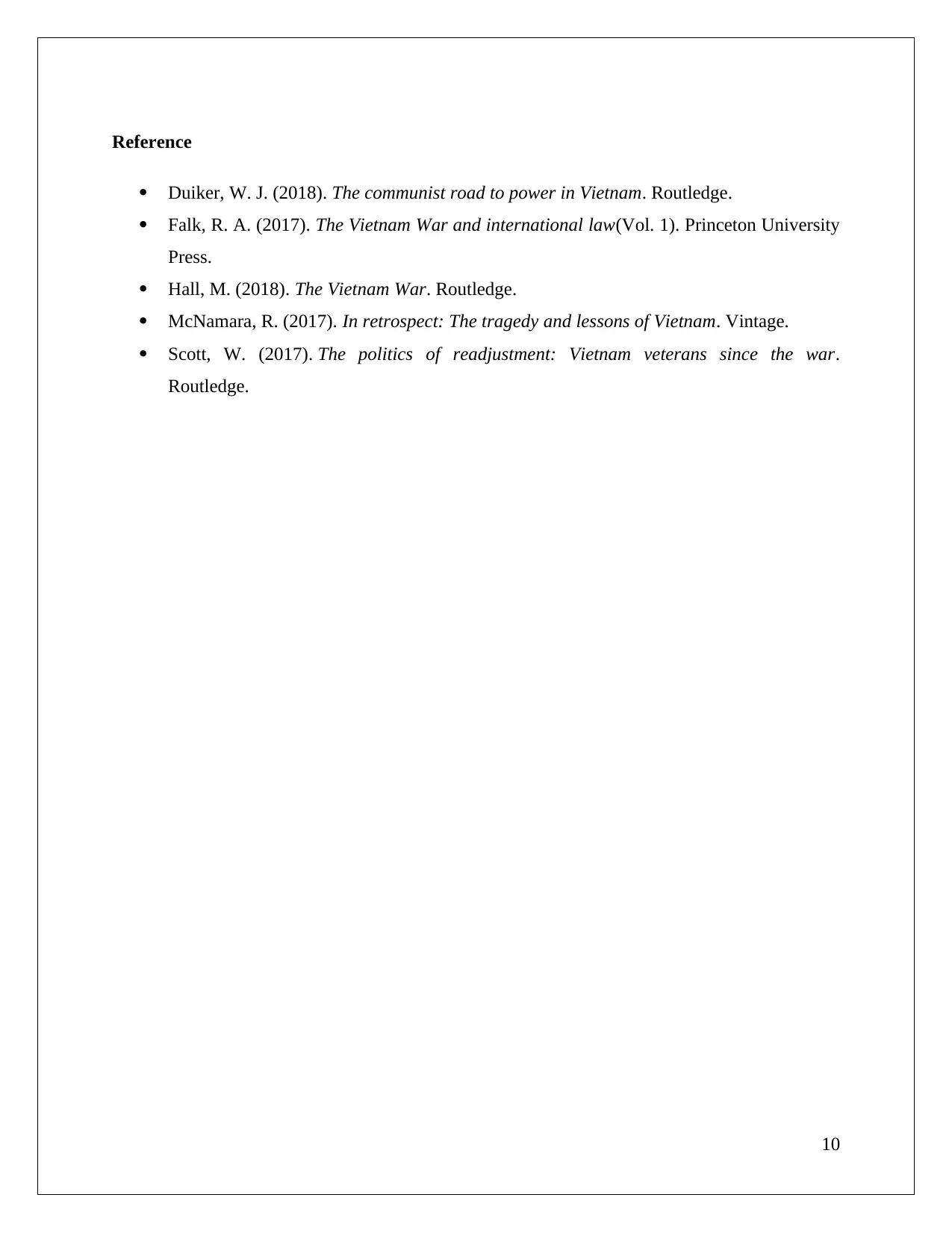
Reference
Duiker, W. J. (2018). The communist road to power in Vietnam. Routledge.
Falk, R. A. (2017). The Vietnam War and international law(Vol. 1). Princeton University
Press.
Hall, M. (2018). The Vietnam War. Routledge.
McNamara, R. (2017). In retrospect: The tragedy and lessons of Vietnam. Vintage.
Scott, W. (2017). The politics of readjustment: Vietnam veterans since the war.
Routledge.
10
Duiker, W. J. (2018). The communist road to power in Vietnam. Routledge.
Falk, R. A. (2017). The Vietnam War and international law(Vol. 1). Princeton University
Press.
Hall, M. (2018). The Vietnam War. Routledge.
McNamara, R. (2017). In retrospect: The tragedy and lessons of Vietnam. Vintage.
Scott, W. (2017). The politics of readjustment: Vietnam veterans since the war.
Routledge.
10
1 out of 10
Related Documents
Your All-in-One AI-Powered Toolkit for Academic Success.
+13062052269
info@desklib.com
Available 24*7 on WhatsApp / Email
![[object Object]](/_next/static/media/star-bottom.7253800d.svg)
Unlock your academic potential
Copyright © 2020–2026 A2Z Services. All Rights Reserved. Developed and managed by ZUCOL.




